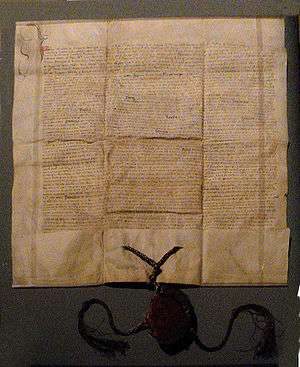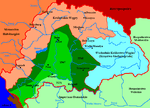Franco-Hungarian alliance

| Foreign alliances of France | |||||||||||||||||||||||||||||||||||||||||||||||||||||
|---|---|---|---|---|---|---|---|---|---|---|---|---|---|---|---|---|---|---|---|---|---|---|---|---|---|---|---|---|---|---|---|---|---|---|---|---|---|---|---|---|---|---|---|---|---|---|---|---|---|---|---|---|---|
| |||||||||||||||||||||||||||||||||||||||||||||||||||||
A Franco-Hungarian alliance was formed in October 1528 between Francis I of France and John Zápolya, king of Hungary.[1]
Background
France had already been looking for allies in Central Europe. His ambassador, Antonio Rincon, was employed on several missions to Poland and Hungary between 1522 and 1525. At that time, following the 1522 Battle of Bicocca, Francis was attempting to ally with King Sigismund I the Old of Poland.[2]
In 1524, a Franco-Polish alliance was signed between Francis and Sigismund,[3] but the agreement fell through when Francis was vanquished by Charles V at the Battle of Pavia in 1525.[2]
Alliance with Hungary
From 1526, Francis I again started to look for allies in Central Europe, this time turning his attention to Hungary.[2] In 1528, John Zápolya was in a very vulnerable position, since he had been defeated by Ferdinand of Austria, his rival claimant to the throne of Hungary, at the Battle of Tokay in August 1527.[1] In addition to the French alliance, Zapolya also chose to become a vassal to the Ottoman Empire in February 1528, through the negotiations of Jerome Laski.[1][4] Rincon went to Istanbul to bring the document.[5] That triggered the development of relations between France and the Ottoman Empire.[1]
The treaty was signed in France at Fontainebleau and Paris on 23 and 28 October 1528.[6] It was then ratified by Zapolya at Buda on 1 September 1529.[6] Through the treaty Francis promised to help Zapolya financially and through other means. In exchange, Zapolya agree to continue the fight against Ferdinand of Austria and to provide Hungarian troops to Francis in Italy.[6]
In the Little War in Hungary, France fought side by side with Zápolya and Suleiman the Magnificent against the Habsburg. A French artillery unit was dispatched to the war in Hungary in 1543–1544 and attached to the Ottoman Army.[7][8][9]
See also
Notes
- 1 2 3 4 The companion to British history Charles Arnold-Baker p.537
- 1 2 3 The Papacy and the Levant (1204–1571) by Kenneth M. Setton p.312
- ↑ The Cambridge History of Poland by Oskar Halecki p.309
- ↑ The Papacy and the Levant (1204–1571) by Kenneth M. Setton p.314
- ↑ Garnier, p.16
- 1 2 3 The Papacy and the Levant (1204–1571) by Kenneth M. Setton p.322
- ↑ The Ottoman Empire and early modern Europe by Daniel Goffman, p.111
- ↑ Firearms of the Islamic world, p.38
- ↑ The Cambridge History of Islam, p.328
References
- Garnier, Edith L'Alliance Impie Editions du Felin, 2008, Paris ISBN 978-2-86645-678-8 Interview
